- Home
- Phyllis Ann Karr
Frostflower and Windbourne (Frostflower & Thorn) Page 3
Frostflower and Windbourne (Frostflower & Thorn) Read online
Page 3
Coarsecut laughed. “Who’s going to raid his Reverence? Nearest farmer’s two days away and not likely to want our land when he can look south. This farm hasn’t been raided by anyone but a few bloody outlaws since the walls went up, and the last outlaw pack that got big enough to try it was before my time. Even the rats go midlands these years. They say his Reverence’s ancestor only built the walls because he kept having nightmares about the raid that drove him up here.”
They were in sight of the Hall by now. It looked much like Maldron’s Great Hall, the ancient pattern for a priest’s dwelling in the center of his farm: the long, tall white rectangle with a pillared front facing south, a row of alcove chambers cupping out on each side, and part of the long curve of the garden wall visible in back. But while Maldron’s garden wall had risen almost as high as the building itself, towering well above a person’s head, Elvannon’s appeared hardly waist high, offering all his people a view of his herbs, flowers, and small inner Truth Grove. Elvannon’s whole dwelling seemed smaller than Maldron’s, and lacked the mosaic that had decorated Maldron’s even on the outside.
Elvannon’s winter door was open wide. The priest and priestess stood on the small porch, between the pillars, with two younger priestesses behind them. At least thirty people waited along the wheelpath: workers and children in faded green and orange garments; six or seven warriors, one in a blue tunic and another wearing a short, fur-trimmed cape; two houseservants and a child whom the sorceress mistook at first for more priests because they wore farmers’ white, though yellowed and decorated with strips of green and russet cloth. Together with the ten or twelve who already followed Frostflower and Coarsecut, this must be the entire population of Elvannon’s Farm, gathered to see how their priest and the sorceress would face one another.
For the first time since passing out of sight of the midlands warrior and her spear, Frostflower trembled. The meeting no longer appeared easy and long overdue. And the smell of cooking meat was in the air. Frostflower had not smelled it since last summer, and the tolerance she had acquired then was gone now.
The raidleader halted and lifted fist to forehead in salute. There could be no form for the sorceress to follow at this point. Hugging the blanket, she left Coarsecut’s side and walked the remaining twenty paces between the lines of farmers’ folk to the door of the Hall. One baby, who seemed to be smiling in its father’s arms, gurgled and waved a knotted rag toy at her. Otherwise, all were silent.
She reached the porch and stopped. She did not quite dare look up and risk startling the priest with her eyes, nor, after the reaction of the midlands warrior, did she quite dare use a priestly formula of greeting.
“Frostflower, is it?” said the old farmer-priest.
She glanced up very fleetingly and saw, in the many fine, soft age wrinkles about his mouth and eyes, an expression that seemed to reflect confusion equal to her own, even mixed with the same apprehension.
“Reverence.” She held out her blanket. “I come in friendship…if you will have it…in trust between us, if you will accept it.”
The words seemed stiff and proud as she said them. Nervousness gave them a defiant sound far from what she wished. With one priestess—Inmara—she had formed a bond of trust and sympathy; but that had been more than half a year ago, and Elvannon was not Inmara.
After a moment’s hesitation, however, he lifted the blanket from her arms, unfolded it, and touched the crossed blades of grass and the five eggs arranged like petals. “You have woven our symbols into it?”
She nodded. “It was not a presumption, Reverence? I meant no presumption.”
“It is…unexpected. We did not think you knew our symbols so well.”
“I saw them last summer. Perhaps they are clumsily done? I tried to weave only the ones I best remembered.”
Refolding the blanket and draping it over his arm, he reached down and took Frostflower’s left hand between his own, enheartening her to look up. “So your are the one with eyes of different colors,” he said, and smiled. “The symbols are not worked as our people would work them, but the weaving, in itself, is far from clumsy. And you have made the half-day’s journey in the lingering chill and mud in order to bring us a gift, Frostflower?”
“And…and to ask a favor of you, Reverence. A great favor, perhaps too great.” She drew a deep breath. “I would ask you for learning.”
“For our learning? For priestly learning?”
“For priestly learning, Reverence. If…I will ask for no more than you teach your common folk. I can read my own people’s writing, Reverence, but not your signs. I…I ask for only what you might teach a weaver, or a warrior, who had a great desire to know as much as possible…”
By everything her own people believed, reasoned, and thought they knew of the One God and the One God’s creation, she should not have kept her powers after losing her virginity. A winter of debate with her own people in Windslope Retreat had given her no explanation. So she had come to look for an answer in the farmers’ creed, among the beliefs she had once called superstition, but some of which had seemed to prove valid. She risked losing what remained of her own faith. But not even the sorcerous creed was worthy of belief unless it was true.
At last Elvannon said, “You have eaten, Frostflower?”
She shook her head. She had tried, three or four times on her way down, to eat the cold corn and honey-meal cakes she carried with her, but had only succeeded in swallowing a little milk from her flask. Nor had she been able to breakfast before leaving the retreat.
“You must be hungry, then. You will share our meal?”
She did not yet feel hungry, but she realized that in a few moments, as the tension eased, she might be very hungry indeed, even despite the smell of boiling meat in the air. “We do not eat flesh, Reverence,” she said apologetically.
“No? Well, well, it’s not the only food we put on our table, even at this season. Will you take dried fish? Locust paste? Cheese?”
“The cheese, yes, with thanks. Not the fish nor the locusts, Reverence. But milk and eggs we eat, and what can be made from them.” The Windslope sorceri had never acquired the skill of making cheese, but Frostflower had developed a strong liking for it, almost a craving, during her travels last summer.
“Well. Come in, then, eat what you will and leave what you will.” said the old priestess, with a glance at Elvannon. Some unvoiced question and answer seemed to pass between them, for the priest nodded and gave the blanket to the priestess. She, in turn, gave it to one of the younger women who stood in the doorway behind. Then she extended her hands to the sorceress. “Frostflower, I am Coarvedda, and these are our daughters, Enelma and Velcora. Come, eat with us, and perhaps we can talk further of this…this price you ask in return for your…gift.” She spoke the last words with humor, but it seemed a friendly jest, not a mockery nor a thinly veiled refusal. Frostflower took Coarvedda’s hands and mounted the porch’s single step.
Someone gave a loud yawk of disapproval, and someone else exclaimed, “Great Seven Names!” Glancing back, Frostflower guessed the sounds had come from the warrior in the blue tunic and the one with a fur-lined cape—their rich dress suggested that they, like Quickshaft, were midlands women come here to mend their wounds.
Elvannon looked steadily at the one with the fur-lined cape. “Hatchslices?”
“You’re taking a sorceron in for a guest?” the warrior replied. “Azkor’s talons, Reverence, do you want the gods to scald us all?”
Elvannon stood a little straighter. “Would you speak in such a voice to one of your midlands priests, warrior? We of the edgelands live in peace, and our peace allows us time for study. We may own fewer scrolls than your wealthy farmers of the midlands, but perhaps we know the few we own more thoroughly. And if I, a priest of Voma and Aomu, Elraec and Deactire, a guardian of the Ten Candles as well as of
the Hollowed Sun, the Crossed Wheat, the Fertile Wreath, and the Bare Tree—aye, and one who keeps a special altar to Great Jehandru of the Seven Secret Names—if I see no reason to withhold welcome from any person who comes in peace and friendship, who are you, warrior, to instruct me in the will of the gods?”
Frostflower suppressed a shudder. Although Elvannon’s voice was raised in her defense, it had much the same sound as the harangues which that other priest had raised against her and Thorn last summer. For a moment she faltered; but Coarvedda’s arm was gentle around her shoulders.
After a short pause Elvannon spoke again, more quietly, this time addressing all his folk. “Three generations ago, my great-grandfather, one of those who wore the name Elvannon before me, entertained a sorcerer several times—a man whom he called friend—in this same Hall. Eanalda, the grandmother of that Elvannon, entertained two friends from among the sorceri of Windslope. Back to the year when our ancestor first walled his farm there have been generations when certain of the sorceri visited us freely. Nor have our visitors ever corrupted our faith. Have not our rituals remained as pure as those of the very centerlands? Walls would not keep us safe from the powers of sorceri. It is living in friendship that keeps us safe.”
An approving murmur went up, and Elvannon’s raidleader began to sing one of the last verses of the ballad, several voices joining in. Coarvedda and her daughters turned and led Frostflower through the vestibule into the long hall.
Inside as well as outside, Elvannon’s home lacked splendor. The mosaic was entirely chips of local stone, with more gray than white. The designs were in browns, blacks, and muted reds; there were no flecks of gold or silver, and only a few bright gemstones of the more common varieties. Whatever the mountains yielded of value must have gone into trade with the midlands. Although decorated with its own cleanness and simplicity of line, Elvannon’s ancient home was less richly embellished even than some of the buildings at Windslope Retreat. There were many wood panels, carved with painstaking care, but they lacked paint, though some of the lighter wood had been stained with cloth-dye beneath a coat of resin varnish. The floor was tiled, not with tiny chips no larger than those of the wall mosaics, but with slabs of granite, some the length of a forearm, cut into geometrical shapes and so deeply worn that more recent stones had been laid over the original flooring along the most often used paths.
Elvannon, who was still on the porch, raised a chant in the old language, the priests’ ritual language, with his folk chanting a few words of ritual agreement in the common language. Meanwhile, Coarvedda walked to the dais, took a pinch of powder from a stone box in a wall niche, and sprinkled it on the brazier. A cloud of incense rose from the glowing coals. The priestess held Frostflower’s blanket in the incense while she chanted, hurriedly and emotionlessly, a few verses in the old language.
“We trust your gift, Frostflower,” she explained when this brief ceremony was finished. “We do this only for the sake of visitors and traders, so that we can truthfully assure them all the goods we have from your people are purified. Now, come.” She smiled. “We’ll spread it out on my bed and talk for a few moments until they’re through out there and ready to lay the meal.”
CHAPTER 3
In a sunny area of her private garden, between Hall and Truth Grove, the priestess Eleva rose from her knees and kicked the side of one of her steambeds.
The flowers had begun well enough when they sprouted in their new, circular beds almost three hen’s-hatchings ago. The thin parchment coverings had seemed to let the sun’s warmth through and keep it in; the soil had remained loose and soft under gentle, frequent sprinklings with warm water; in especially cold weather the priestess herself had built small fires around the outside walls of the steambeds and heated small rocks to arrange in the top layer of soil between the rows of seeds. She had felt like dancing as recklessly as her small children Evron and Evra on the day they found the first new shoots of violet and goddess-tears in the steambeds, while the rest of the garden still lay under snow.
But as the spring warmed and the other plants began to bud and blow as usual, more and more of the steambed flowers browned and shriveled. Eleva transplanted some of the survivors with her own hands, nursed and coddled the others as desperately as if they were sick babes…all to no avail. At best, she would gain a few plants almost as good as those grown in the regular way.
Yet she was sure the idea was sound—the steambeds should work. She had developed this plan for nine years, since the goddess Raellis had first shown it to her in a dream during her seventeenth winter. If her parents had given her a corner of their garden for her scheme, if her brother and sister had not laughed, or if her husband Deveron had let her try it here during those years of their marriage when he ruled the farm and she had so little to do besides bear him a son and daughter and watch him marry again and give the greater part of his affection to the younger wife and her son…Eleva had not been permitted so much as a major share in the raising of her own children, for Creamybosom used the fact that she had nursed Deveron since his mother’s early death as authority to demand almost total care of Evron and Evra—but when Intassa’s son was born only a year after Evra, Deveron had told Creamybosom she was growing too old to care for three babes at once, and preserved his younger wife’s child for her own care.
And now that at last I have the power to do what I would, thought Eleva, I have the farm to rule and not enough time for anything else! Sweet Raellis, why did you waste your inspiration?
She kicked the steambed again, hard enough to hurt her foot and make her catch her breath.
“A priestess does not show petty anger, sister.”
She turned at the familiar, disliked voice behind her. Had he not made free to enter her garden, had she still been alone, she would have sat on the knee-high steambed wall, removed her sandal, and rubbed her tingling toes. As it was, she remained standing. “The days when you could teach me worthless things and laugh at me are past, Rondasu. I am a ruling lady now, this is my own farm—Eleva’s Farm—and I did not invite you to visit me today.”
“It will not be your farm long, little sister, if you squander your time and effort on such heretical stupidities as this.” He strolled to the steambed and put one foot negligently up on the wall. “Trying to grow flowers in the winter! It’s almost sorcerous.”
She made a sound like a warrior grunting.
Rondasu shook his head and pulled one of the healthier irises up by its stem. “No wonder the gods are blighting your plants.”
“Out!” She could not keep her voice from shaking. “You have not even the excuse of visiting Intassa now!”
He shook dirt from the roots of the iris and examined them. “Ungenerous of you, sister. You are always welcome back in our Hall and garden.”
“By the Seven Secret Names!” she whispered. “I think if I were not your sister, you would try to marry me, too!”
That, at last, seemed to annoy him. “I married Intassa for love, Eleva. Love of herself and love of my sister’s husband.”
“Of course it was for love of her—since she could not bring you your sister’s husband’s farm! How unfortunate for you that I remain Intassa’s elder.”
“By the gods, Lady Eleva, I think I could bring you before the High Gathering today and have you deposed as mad, heretic, and unfit to rule!”
“Aye, perhaps you could, if you cared to leave your own farm for that length of time. But remember, brother, I can claim my own seat in the High Gathering now, and my own place in Center-of-Everywhere! Meanwhile, I tell you to go!”
He sat on the wall of the steambed. “Will you push me through the door, down the wheelpath, and out the gate with your own arms, little sister?” He shook his head. “And even if you had the strength, would you show your people such a spectacle of one priest disrespecting another’s body?”
She sta
red at him for a moment. “Never invite me to your Hall, brother,” she said. “Not if you wish to eat your food in safety.”
She strode away from him, back through her garden, through her Hall, to her office beside the front door—the special alcove of the ruling priest, Deveron’s office until his death. When the doorcurtain was closed, not even another priest could lawfully draw it aside and enter without the permission of its rightful occupant. Rondasu might break in upon her almost anywhere else, not excluding her very bedchamber, but even he must respect her privacy here.
She waited, gripping the large, round, wax-coated agate that had served the priests of this farm as a tablet-smoother since the time of Deveron’s great-grandparents. Had she clung to the thin silver stylus or one of the pens, she might have driven the point into her hand; had she touched a tablet, she would have spoiled its wax layer beyond smoothing; had she picked up a sheet of parchment, she would have crumpled or tried to tear it.
At last her brother left. He paused in the entranceway, turning, perhaps, to look at the curtain. She stared back as if they could see one another clearly through the thin, bleached wool.
He went on out, mounted his horse—probably Rastar, the last and best offspring that Eleva’s own old rust-red stallion Pride had sired in her father Rondrun’s Farm before she rode him through Deveron’s gate. Rondasu usually rode Rastar when he paid his unwelcome visits, as if to tempt Eleva into offering once more to buy the mare, now six years old. Rondasu’s price was outrageous.
When she could no longer hear the sound of his mount’s hoofs, Eleva put her head down and wept for a few moments. With some effort, she wept very quietly, to guard against anyone overhearing. Then she sat up, wiped her face, and busied herself with the task of deciphering her dead husband’s records. Deveron had kept them in a fashion he claimed was traditional on his farm; Eleva suspected that in reality he had devised it himself to prevent her understanding it. Whenever she had asked Deveron to instruct her in the mysteries of his office, he had laughed, telling her their son Evron would be grown and fitted to rule the farm well before he himself was dead. Neither had Eleva’s father ever given her more than whimsical instruction in such matters, pointing out that even if she were to remain unmarried and Rondasu were to die before his time, the rule of their own farm would fall to Shara as the elder daughter.

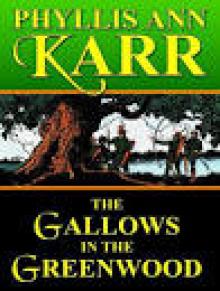 The Gallows in the Greenwood
The Gallows in the Greenwood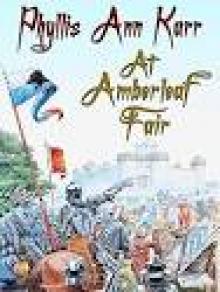 At Amberleaf Fair
At Amberleaf Fair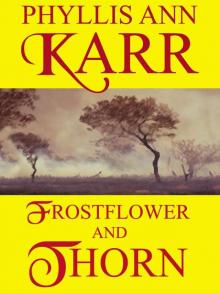 Frostflower and Thorn
Frostflower and Thorn The Fanciers & Realizers MEGAPACK
The Fanciers & Realizers MEGAPACK All But a Pleasure
All But a Pleasure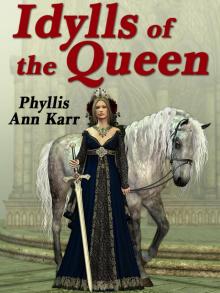 The Idylls of the Queen
The Idylls of the Queen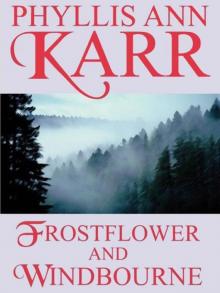 Frostflower and Windbourne (Frostflower & Thorn)
Frostflower and Windbourne (Frostflower & Thorn)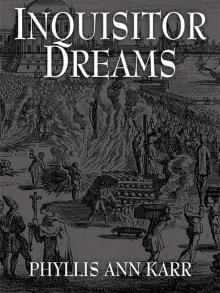 Inquisitor Dreams
Inquisitor Dreams